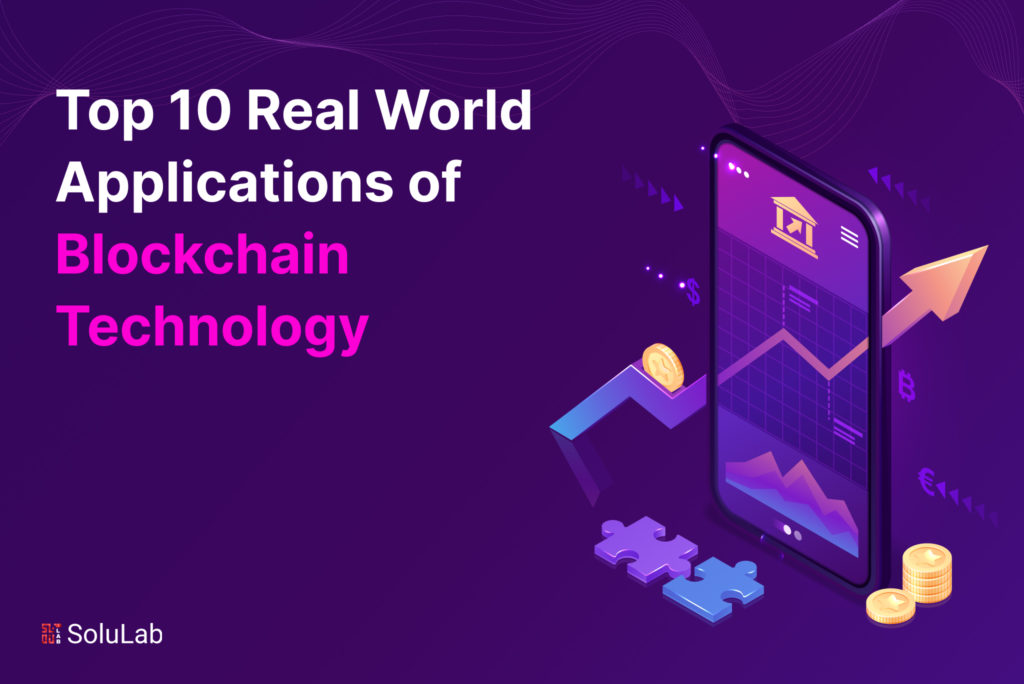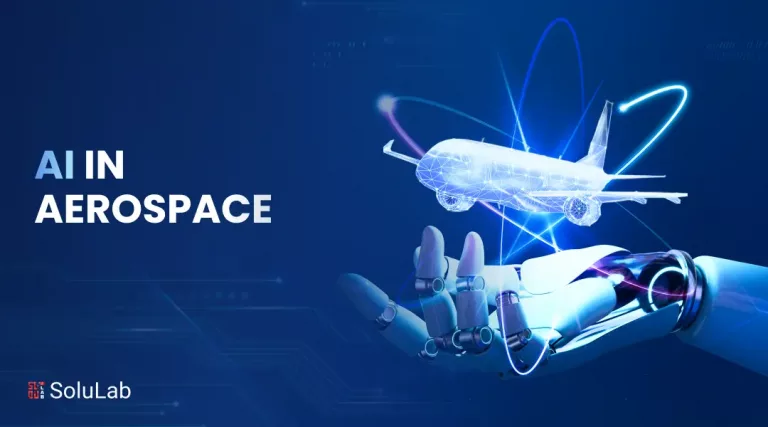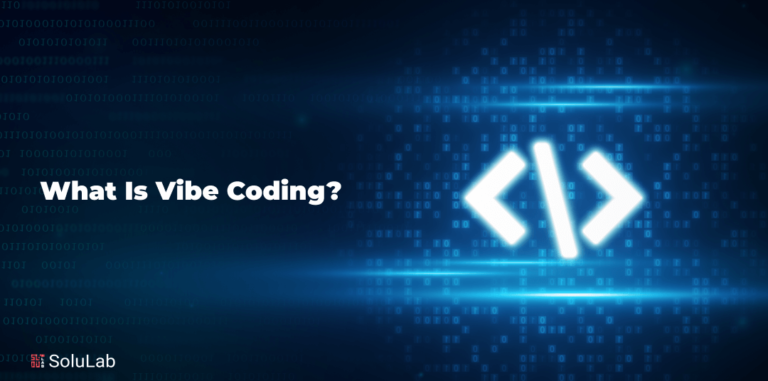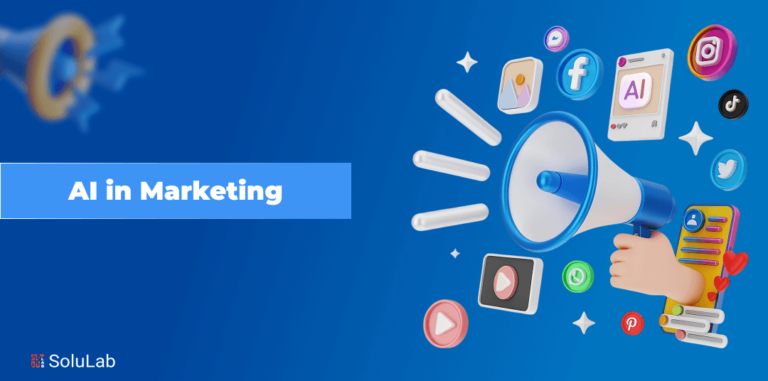
In today’s rapidly evolving digital landscape, blockchain technology has emerged as a transformative force, reshaping the way we approach data management, security, and transparency. Originally conceived as the underlying technology for cryptocurrencies like Bitcoin, blockchain has evolved far beyond its initial application. This decentralized, immutable, and secure system has paved the way for a multitude of practical use cases across various industries. In this blog, we will delve into the top 10 real-world applications of blockchain technology, showcasing its versatility and potential to revolutionize the way we conduct business and secure information.
What is Blockchain Technology?
Before we dive into its applications, it’s crucial to grasp the fundamental concept of blockchain technology. At its core, a blockchain solution is a distributed ledger system that records transactions across a network of computers in a secure and immutable way. It operates within a blockchain ecosystem of protocols, networks, and platforms, providing a tamper-proof system for data management and exchange.
The blockchain network consists of nodes (computers) that validate and store transactions in a decentralized manner, ensuring no single entity has complete control. Transactions are grouped into blocks, and each new block is linked to the previous one, forming a chain of data blocks – hence the name “blockchain.” This architecture ensures data integrity, security, and transparency, making blockchain technology suitable for a wide range of applications.
Is Blockchain Safe to Use?
In a number of ways, blockchain technology allows decentralized security and trust. To begin, new blocks are constantly added in a chronological and linear order. They are always appended to the blockchain’s “end”.
Unless a significant part of the network agrees to do so, changing what is inside of a block after it has been appended to the end of the blockchain is extremely difficult. This is due to the fact that each block will include its own hash, as well as the hash of the prior one and the previously determined date.
A mathematical function converts digital information into a sequence of numbers and characters to generate hash codes. If that data is changed in any manner, the hash code will be changed as well. This makes blockchain development solutions safe to use.
Read Also: Top Blockchain Trends in 2025
How Does it Work?
Blockchain transactions are both anonymous and safe. Peer-to-peer transactions on the blockchain are immediate and transparent.
Trust is distributed from strong middlemen to a wide global network via blockchain. This worldwide network uses vast cooperation, coding, and encryption to create a public record of every transaction that occurs on the network.
A block is a piece of data or a transaction that is recorded in a blockchain. When a transaction or data storage is completed, the data block is added to the Blockchain as a permanent database.
When a block is finished, a new block is created to hold fresh data. Every block is linked in a chain in chronological sequence, with each block having a connection to the previous block.
Benefits of Using Blockchain Technology
Blockchain technology has gained widespread recognition for its potential to revolutionize various industries. From financial services to supply chain management, the benefits of utilizing blockchain technology are numerous and far-reaching. In this section, we will explore some of the key benefits of incorporating blockchain into your business processes with a focus on the role of blockchain development services and blockchain developers.

1. Enhanced Security: One of the foremost benefits of blockchain technology is its exceptional security features. Data stored on a blockchain is cryptographically secured, making it highly resistant to hacking and fraud. Each block of data is linked to the previous one, creating an unbreakable chain. Blockchain development services ensure that robust security protocols are implemented to protect sensitive information.
2. Transparency and Traceability: Blockchain’s transparent and immutable nature allows for real-time tracking and auditing of transactions and data. This transparency is especially valuable in supply chain management, where it can be used to trace the origin and journey of products, ensuring authenticity and quality. Blockchain services can help businesses set up such systems efficiently.
3. Reduced Costs: Implementing blockchain technology can significantly reduce operational costs by eliminating intermediaries and streamlining processes. Smart contracts, for example, automate agreements and transactions, reducing the need for intermediaries like lawyers and brokers. Blockchain developers can customize smart contracts to fit specific business needs.
4. Efficiency and Speed: Blockchain technology enables faster and more efficient transactions, particularly in cross-border payments and remittances. Transactions that typically take days or weeks can be completed in minutes or even seconds. Blockchain development services play a crucial role in optimizing the performance of blockchain networks.
Top 10 Real-World Applications of Blockchain Technology
Blockchain technology, once primarily associated with cryptocurrencies, has evolved into a versatile solution with a wide range of real-world applications. The ability of blockchain platforms to provide security, transparency, and decentralization makes it a game-changer across various industries. In this article, we’ll explore the top 10 real-world applications of blockchain technology.

-
Smart Contracts
Smart contracts are self-executing agreements with terms encoded in code. They automate and enforce contract execution, reducing the need for intermediaries in legal and financial transactions. Blockchain ensures their security and immutability, making them reliable tools for various applications, from insurance payouts to real estate transactions.
These contracts execute automatically when predefined conditions are met, minimizing the risk of disputes and fraud. Smart contracts enhance efficiency, reduce costs, and increase transparency in a wide range of industries.
-
Healthcare
Healthcare will be regarded as among the most competitive industries in the world, and blockchain technology is likely to be utilized or pushed by it. It may be viewed as the development of Blockchain Technology. The whole healthcare value chain can use blockchain, which is the supply chain’s potential business model.
Blockchain technology applications in healthcare will basically automate and change everything, from payments and health records to data collection and analytics, to the benefit of all parties involved, including patients and consumers as well as clinicians, administrators, and healthcare organizations.
-
Real Estate
Blockchain technology and applications have the ability to completely transform the real estate industry. Smart contracts are being developed by stakeholders to allow real estate agreements, escrows, and property documentation to be completed without the use of title firms or attorneys. In the future, a buyer may be able to purchase a property and finalize the transaction by simply clicking on a shopping cart on a website.
The blockchain solution will make sure that the buyer receives the title and that the seller is compensated in cryptocurrency. Money and transaction processing will undoubtedly alter, and that shift is already beginning. To prosper in the blockchain era, brokers will need to adjust their business models in order to comprehend smart transactions.
-
IoT
Blockchain enables all Internet of Things devices to improve transparency and safety in their interconnected ecosystems. One significant example of blockchain implementation in IoT is around smart homes. Although IoT allows home security systems to be handled remotely from mobile devices, the typical centralized way to transmit data created by IoT devices fails security standards as well as data ownership. Blockchain has the ability to take smart homes to the next level by addressing security concerns and eliminating centralized infrastructure.
Telstra, an Australian telecommunications and media business, for example, offers smart home solutions. To ensure that data gathered by smart devices is not tampered with, the firm employs blockchain and biometric authentication—the blockchain stores sensitive user data such as fingerprints, voice recognition, and facial recognition. When data is recorded on the blockchain, it becomes unchangeable, and access is restricted to a small group of people.
-
Supply Chain
Companies are seeking methods that will not only streamline supply chain management but also figure out various business processes that comprise supply chains in an era where supply chains have grown increasingly complicated due to the developing demands of the consumer and other stakeholders. Many supply chain providers feel that blockchain technology may be used to successfully handle their problems because of its numerous and diverse uses.
The applications of blockchain in the supply chain vertical may improve a variety of operations, from streamlining supplier payments, cold chain tracking, and performing RFID-driven contract bids to gathering product status at the point of production and utilizing smart contracts for transferring excess power from solar panels. Ethereum will be used to tokenize the shipping sector in a future enterprise.
-
Government Sector
While blockchain applications are increasingly diminishing the requirement for centralized government organizations, the conflict between governments and cryptocurrencies is expected to reach a climax in the coming years. Governments, on the other hand, are aware of the potential that blockchains may unlock and are thus always on the lookout for ways to apply blockchain services to enhance and overhaul operational procedures. Many governments have used blockchains for a number of purposes.
Countries such as Venezuela and Russia are implementing their own national cryptocurrencies in order to increase transparency and reduce corruption. Furthermore, blockchains may be utilized to create immutable voting systems that eliminate forgeries and fraud as myths. Additionally, blockchains may be used to enhance identity management and tax administration.
-
Cybersecurity
As firms become increasingly reliant on the Internet and technologies to generate money and articulate business models, the opportunity for hackers to attack enterprises has grown enormously. The demand for effective cybersecurity solutions is at a record high in this state of amazement. What solution is more effective than blockchains’ decentralized structure? Blockchain development, with its distributed ledger technology, may fundamentally improve cyber protection.
Based on the fundamental qualities of operating resilience, data encryption, auditability, transparency, and immutability, blockchain systems can prevent fraudulent actions and identify data tampering. Because blockchains are distributed, they do not allow for a single point of failure and hence provide better security than database-driven transactional systems.
-
Social Media
Not long ago, social media platforms absorbed humanity from all sides. However, due to various transgressions, such as personal data breaches and inadequate recompense for consumers, these platforms are losing appeal. The social media is losing its edge’ is not incorrect.
Blockchain enters the picture to transform the social media landscape. Technology improves social media systems to a whole new level. Blockchain technology, with its decentralized and distributed ledger structure, presents a system through which individuals may exert more control over the protection of personal information while possibly receiving monetary rewards for the viral material they select and share. Blockchain technology has the potential to elevate traditional social media to new heights.
-
AI
AI built on top of blockchains is frequently referred to as an accounting technology disruptor and has the potential to be one of the most potent and hazardous inventions ever. Decentralized Autonomous Organizations (DAOs) might be created by decentralizing AI.
DAOs are businesses that can function independently and decentralizedly thanks to smart contracts, without a single entity controlling everything and making all the choices. When carried out properly, an AI DAO may eventually replace human design by learning from data to optimize itself far more effectively than was possible. Together, blockchains and AI, or what we may refer to as a “decentralized AI,” might open up new avenues for data security, data monetization, and intelligent algorithms.
-
Food Safety
Blockchain enables the tracking of food items from farm to table, ensuring food safety and traceability. In the event of contamination outbreaks, authorities can quickly identify affected products and minimize health risks. Consumers can also verify the authenticity of organic or locally sourced foods.
This technology builds trust in the food supply chain, reduces waste through better inventory management, and facilitates compliance with food safety regulations.
Final Words
Blockchain technology is growing, from powering cryptocurrencies to impacting various real-world industries. From improving supply chain transparency to securing digital identities, blockchain’s decentralized, transparent, and immutable nature is transforming how businesses operate. These real-world applications of blockchain showcase its potential to drive innovation across finance, healthcare, logistics, real estate, and more. By leveraging blockchain, businesses can achieve higher levels of security, efficiency, and trust while reducing costs and complexity.
However, implementing blockchain solutions requires specialized expertise and a strategic approach. Partnering with an experienced Blockchain Consulting Company like SoluLab can help you unlock the full potential of this technology. SoluLab offers end-to-end blockchain development services, designed to your business needs. Whether you want to streamline processes, secure data, or introduce smart contracts, SoluLab has the technical expertise and industry experience to make it happen.
When you Hire Blockchain Developer from SoluLab, you gain access to a dedicated team of professionals skilled in building secure, scalable, and compliant blockchain applications. SoluLab helps businesses navigate the complexities of blockchain implementation, ensuring that their solution is robust and future-proof. From consultation and development to deployment and maintenance, SoluLab guides you at every step, ensuring a seamless transition to blockchain technology that drives growth and success.
If you’re ready to explore how blockchain can benefit your business, SoluLab is here to help you turn your ideas into reality.
FAQs
1. What is blockchain technology, and how does it work?
Blockchain is a decentralized digital ledger that records transactions across multiple computers securely and transparently. It works by organizing data into blocks, which are linked in a chain, making the information immutable and tamper-resistant.
2. What are the main benefits of using blockchain technology in real-world applications?
Blockchain technology offers benefits like enhanced security, transparency, decentralization, and immutability. It can reduce fraud, streamline processes, and provide a higher level of trust in transactions.
3. Which industries are currently adopting blockchain technology?
Blockchain is being adopted in industries such as finance, healthcare, logistics, real estate, supply chain management, government, and entertainment, among others. It is used to improve security, transparency, and efficiency in these sectors.
4. Can blockchain technology improve supply chain management?
Yes, blockchain can significantly improve supply chain management by providing real-time tracking, ensuring transparency, and reducing inefficiencies. It enables stakeholders to trace products and verify authenticity throughout the supply chain.
5. How can blockchain improve the security of digital identity systems?
Blockchain ensures that digital identity systems are more secure by creating decentralized, immutable records that cannot be tampered with. This prevents fraud, unauthorized access, and identity theft.
6. How can businesses get started with blockchain technology?
Businesses can start by consulting with a Blockchain Development Company to assess their needs, identify areas for blockchain implementation, and develop a custom blockchain solution. Hiring expert blockchain developers can help ensure a smooth adoption process and successful project execution.






